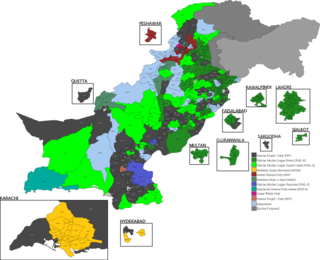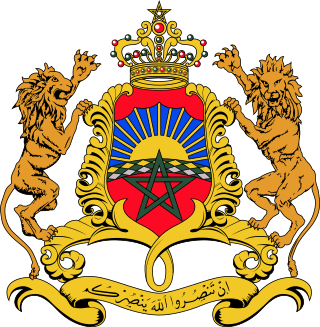
Politics of Algeria takes place in a framework of a constitutional semi-presidential republic, whereby the President of Algeria is head of state while the Prime Minister of Algeria is the head of government. Executive power is exercised by the government. Legislative power is vested in both the government and the two chambers of parliament, the People's National Assembly and the Council of the Nation.

The Democratic National Rally is a political party in Algeria. The party held its Second Congress on 15–17 May 2003.

General elections were held in South Africa on Wednesday, 14 April 2004. The African National Congress (ANC) of President Thabo Mbeki, which came to power after the end of the apartheid system in 1994, was re-elected with an increased majority.

Bulgaria elects a head of state—the president—and a legislature on a national level. The president is elected for a five-year term by the people directly. The National Assembly has 240 members elected for a four-year term by proportional representation in multi-seat constituencies with a 4% threshold. Bulgaria has a multi-party system in which usually no party receives a required majority and parties have to collaborate to form governments, generally via confidence and supply or coalition agreements.
European Solidarity is a political party in Ukraine. It has its roots in a parliamentary group called Solidarity dating from 2000 and has existed since in various forms as a political outlet for Petro Poroshenko. The party with its then name Petro Poroshenko Bloc won 132 of the 423 contested seats in the 2014 Ukrainian parliamentary election, more than any other party.

The Movement for the Liberation of the Central African People is a political party in the Central African Republic. It is a member of the Progressive Alliance.

The People's National Assembly is the lower house of the Algerian Parliament. It is composed of 407 members directly elected by the population. Of the 407 seats, 8 are reserved for Algerians living abroad. Members of the People's National Assembly are directly elected through proportional representation in multiple-member districts and serve terms lasting five years at a time. The last election for this body was held on 12 June 2021. The minimum age for election to the Assembly is 28.

The 2007 Northern Ireland Assembly election was held on Wednesday, 7 March 2007. It was the third election to take place since the devolved assembly was established in 1998. The election saw endorsement of the St Andrews Agreement and the two largest parties, the Democratic Unionist Party (DUP) and Sinn Féin, along with the Alliance Party, increase their support, with falls in support for the Ulster Unionist Party (UUP) and the Social Democratic and Labour Party (SDLP).

General elections were held in Pakistan on 18 February 2008 to elect members of the 13th National Assembly and the four Provincial Assemblies.

Parliamentary elections were held in Syria on 7 May 2012 to elect the members of the Syrian People's Council. The elections followed the approval of a new constitution in a referendum on 26 February 2012.

General elections were held in Angola on 31 August 2012 to elect the President and National Assembly. These were the first elections after the new 2010 constitution was instituted. During campaigning, the opposition UNITA and its offshoot CASA-CE accused and criticised the government of corruption and called for greater transparency; this led to protests and arrests the day before the election.
Events from the year 2012 in Algeria

General elections were held in Lebanon on 6 May 2018. Although originally scheduled for 2013, the election was postponed three times in 2013, 2014 and 2017 for various reasons, including the security situation, the failure of the Parliament to elect a new President, and the technical requirements of holding an election. A new electoral law adopted in 2017 provides a proportional representation system for the first time.

The 2015 United Kingdom general election was held on Thursday, 7 May 2015 to elect 650 members of Parliament (MPs) to the House of Commons. The Conservative Party, led by Prime Minister David Cameron, won an unexpected majority victory of ten seats; they had been leading a coalition government with the Liberal Democrats. It was the last general election to be held before the UK voted to leave the European Union (EU) in June 2016.

General elections were held in Morocco on 7 October 2016. The ruling Justice and Development Party remained the largest party, winning 125 of the 395 seats in the House of Representatives, a gain of 18 seats compared to the 2011 elections.
Enis Imamović is a Serbian politician from the country's Bosniak community. He served in the Serbian national assembly from 2012 to 2024 and was a leading member of the Party of Democratic Action of Sandžak (SDA) for many years until leaving the party in late 2023.

Parliamentary elections were held in Bulgaria on 4 April 2021 at the end of the term of the National Assembly elected in 2017. Parties in the governing coalition led by Boyko Borisov lost seats and no party leader was able to form a coalition government within the time limit. This triggered the July 2021 Bulgarian parliamentary election.

The Future Front is an Algerian political party.

Snap parliamentary elections were held in Algeria on 12 June 2021 to elect all 407 members of the People's National Assembly. Initially expected to be held 2022, the elections were brought forward following a constitutional amendment approved in a referendum in November 2020.

Parliamentary elections were held in Benin on 8 January 2023 to elect all 109 members of the National Assembly. The preliminary results of the election were announced on 11 January. The result was a victory for parties supportive of President Patrice Talon, the Progressive Union and Republican Bloc, which together won 81 of the 109 seats.
















